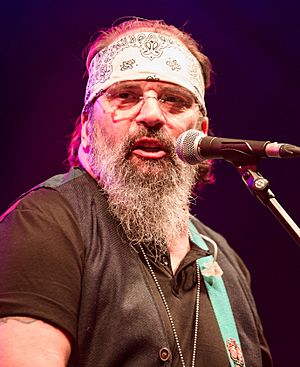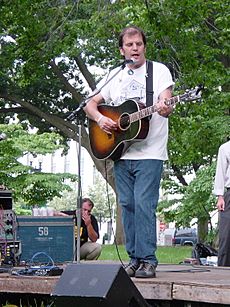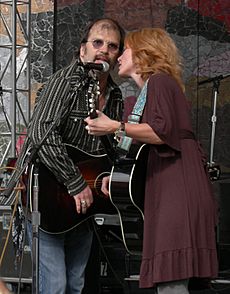Steve Earle facts for kids
Quick facts for kids
Steve Earle
|
|
|---|---|

Earle performing at the Rudolstadt-Festival in 2018
|
|
| Background information | |
| Birth name | Stephen Fain Earle |
| Born | January 17, 1955 Fort Monroe, Virginia, U.S. |
| Origin | San Antonio, Texas, U.S. |
| Genres |
|
| Occupation(s) |
|
| Instruments | |
| Years active | 1968–present |
| Labels |
|
Stephen Fain Earle (born January 17, 1955) is an American singer, songwriter, and musician. He is known for blending different music styles like country, rock, and folk. Steve Earle started his music journey writing songs in Nashville. He released his first short music collection, called an EP, in 1982.
His first big album, Guitar Town, came out in 1986. The main song from that album, also called "Guitar Town", became very popular. Since then, he has released many more albums, totaling 20 studio albums. He has won three Grammy awards for Best Contemporary Folk Album. His song "Copperhead Road", released in 1988, is his most popular single. Many famous artists like Johnny Cash and Willie Nelson have recorded his songs.
Steve Earle has also acted in TV shows, including The Wire and Treme. He has written a novel, a play, and a book of short stories. He is the father of the late singer-songwriter Justin Townes Earle, and they often worked on music together.
Contents
Early Life and Music Beginnings
Steve Earle was born on January 17, 1955, in Fort Monroe, Virginia. His family moved to Texas when he was very young, and he grew up mostly in the San Antonio area.
He started learning to play the guitar when he was 11 years old. By age 13, he was already performing in school talent shows. When he was 16, he left school to focus on music. He moved to Houston and met his music hero, Townes Van Zandt.
Music Career Highlights
Starting Out in Nashville (1974-1999)
In 1974, Steve Earle moved to Nashville to pursue his music dreams. He worked different jobs during the day and played music at night. He wrote songs and played bass guitar for other musicians, like Guy Clark. He even appeared in a 1976 documentary about the Nashville music scene called Heartworn Highways.
After some time, Earle returned to Nashville in the 1980s. He wrote songs for music publishers. Some of his songs were recorded by popular artists like Johnny Lee and Carl Perkins. Later, he was invited to record his own music.
In 1982, he released an EP called Pink & Black with his band, The Dukes. He then signed a record deal with MCA Records. His first full album, Guitar Town, came out in 1986. The title song became a top-10 hit. He followed this with Exit 0 in 1987, which was praised for mixing country and rock music.
In 1988, Earle released Copperhead Road. This album blended folk music with hard rock and even Irish influences. The song "Copperhead Road" tells a story and became his highest-charting song in the United States. It has sold over a million digital copies.
After a break from recording, Steve Earle released Train a Comin' in 1995. This album was nominated for a Grammy Award for Best Contemporary Folk Album. In 1996, he started his own record label, E-Squared Records. He continued to release albums that combined country, rock, and rockabilly sounds. In 1999, he explored bluegrass with the album The Mountain, made with the Del McCoury Band.
Music and Activism (2000-Present)
In the early 2000s, Steve Earle's album Jerusalem shared his views on important topics like being against war and the death penalty. He often talks about his beliefs in his music and interviews.

In 2004, Earle released The Revolution Starts Now, which won a Grammy for best contemporary folk album. The songs on this album were inspired by events like the Iraq War. The title song was even used in a TV advertisement and in promotional materials for the film Fahrenheit 9/11.
Steve Earle hosted a radio show called Hardcore Troubadour on the Outlaw Country channel. He has also been the subject of two biographies about his life and music.

In 2007, he released Washington Square Serenade, which was his first album recorded using digital technology. This album featured his then-wife, Allison Moorer. A song from the album, "Way Down in the Hole", was used as the theme song for the fifth season of the HBO series The Wire, where Earle also acted as a character named Walon.
In 2009, Earle released Townes, a tribute album featuring 15 songs by his hero, Townes Van Zandt. This album earned Earle his third Grammy award.
Steve Earle has continued to release new music. In 2015, he released Terraplane. In 2016, he released an album of duets with Shawn Colvin called Colvin And Earle. His 17th studio album, So You Wannabe an Outlaw, came out in 2017. In 2019, he released GUY, another tribute album, this time to his songwriting friend Guy Clark.
In 2020, Steve Earle was the musical director for a play called Coal Country, which was about a mining disaster. Songs from this play are on his 2020 album Ghosts of West Virginia. In 2021, he collaborated with Willie Nile on a song. As of 2023, he has been working on a musical based on the film Tender Mercies.
In April 2025, Steve Earle was invited by Vince Gill to become a member of the famous Grand Ole Opry. He also made a guest appearance in an episode of the TV series Poker Face.
The Steve Earle Show
The Steve Earle Show was a weekly radio show hosted by Steve Earle. It featured some of his favorite artists and included discussions. The show aired on Sundays. Later, he started hosting a show called Hardcore Troubadour on Sirius Satellite Radio.
Personal Life and Family
Steve Earle has been married several times. He has three sons. His son, Justin Townes Earle, who passed away in 2020, was also a singer-songwriter. Steve Earle also has a son named John Henry, who was diagnosed with autism. Steve Earle has become an advocate for people on the autism spectrum, working to make sure his son and others like him are supported.
Steve Earle's sister, Stacey Earle, is also a musician and songwriter.
Advocacy and Views
Steve Earle is open about his views on important issues. He often shares his thoughts in his song lyrics and in interviews. He is a strong opponent of capital punishment (the death penalty), which he considers a very important cause. He has written songs like "Billy Austin" and "Over Yonder (Jonathan's Song)" that describe the experiences of people on death row. He also wrote "Ellis Unit One" from the perspective of a prison guard.
He believes that everyone should have access to healthcare choices. Since his youngest son was diagnosed with autism, Earle has become a dedicated advocate for people on the autism spectrum.
Discography
See also
 In Spanish: Steve Earle para niños
In Spanish: Steve Earle para niños
 | Audre Lorde |
 | John Berry Meachum |
 | Ferdinand Lee Barnett |

